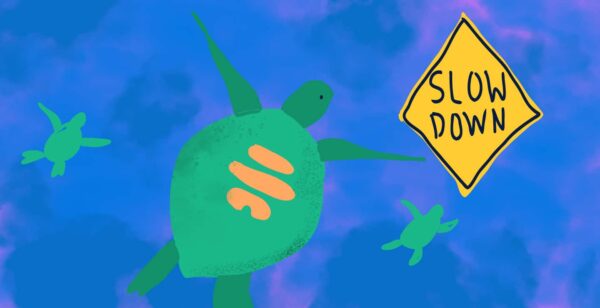Slowing down can help you speed up, but that’s easy to forget in a fast-paced world with quick work turnarounds and lofty goals. Since we all need a reminder about the wonderful effects of slower-paced moments on productivity from time to time, below is some expert advice to help you slow your roll and become more productive in the process.
1. More receptivity and better conversations
“I always tell my team, ‘slow down and meditate, it gives you a clean slate.’ Some people think it’s corny, and not everyone is going to take to meditation. Nonetheless, the more I push the concept of mindfulness in the workplace, the more it benefits our overall performance,” shares Kiran Gollakota, the co-founder and CEO of Lightyear Health.
Take a cue from Gollakota and clear your head before a team meeting – with meditation, if that’s your thing too, or even with a little fresh air away from devices. This helps you let go of preconceived expectations about how the meeting should go and what should be said. As a result, you’ll be more open to hearing ideas and feedback and receptive to your coworkers’ perspectives. This breeds more productive conversations and collaboration.
“Even team members who do not share my passion for mindfulness appreciate the productive communication I am able to facilitate, and this is due in no small part to my mindfulness practice,” adds Gollakota.
2. Increased team efficiency
Terry Barkman is a sailboat coach – and there are surprising parallels between his craft and the business world. For that reason, he always teaches team-building on a sailboat. And, guess what? There is no better metaphor to showcase the way slowing things down can help you speed up in terms of team efficiency.
“When we are rushing, or our team isn’t coordinated clearly, the sailboat slows down. When we are racing, the boat responds to slow, gentle, coordinated movements with speed in real-time. Corporate teams are the same. Proceeding slowly and smoothly with clear objectives, and specifically articulated roles, is the fastest way to get the right thing done,” he says.
In his upcoming TEDx talk, Barkman explores the moment when you and your team have set everything up for success. You’ve chosen a new course, trimmed your sails, everyone is in position and ready, you’ve turned the wheel, and nothing has happened…yet. “The best thing you can do is stand in quiet and persistent confidence that you are moments away from seeing the results you have created. The worst thing you can do is second guess yourself, second-guess yourself, or try to make up work when there isn’t any,” he adds.
Let this be a lesson in deliberate teamwork versus panic-driven hustle.
3. Improved mental health and work quality
Dr. Ryan C. Warner, team wellness expert and clinical psychologist at 1AND1 Life, a black-owned mental health and wellness performance company, says that being busy doesn’t mean being productive, and doing things fast doesn’t mean doing a good job.
“Constant rushing and grinding results in burnout, anxiety, and stress-related illnesses. Our immune systems deteriorate, we can age faster, and we become more susceptible to some sicknesses, like colds,” he says.
“You can’t be productive if you’re stressed out and have no energy. Rushing through tasks also leads to more mistakes, making you work double. Learn to dedicate the right amount of time to every one of your tasks, and you will see the quality of your work improve. You will have more room to focus and make fewer mistakes if you don’t rush.”
4. Better systems and learnings
“Spending more time planning may look like wasting time. On the contrary, it’s the quickest way to high performance, especially over the long haul,” shares time-management guru Dr. Frank Buck.
This can look like slowing down to recognize tasks that you will repeat. “How many things in your job have to be done every month or year at the same time, and you rush around doing them at the 11th hour because you forgot?” says Buck. “Take the time to put them in a good digital task manager and mark them as repeating tasks. The time spent now is recouped many times over as you simply work your list.”
And what about those sentences that you write over and over again? Set up a text expander and reduce the number of keystrokes that you use over time.
Slowing down can also look like taking the time to debrief and capture learnings, which will allow you to be more productive when it’s time to produce new work. “The benefit is when we start a new project, we never start from a blank page. We rely on the best from the past to give us a head start,” according to Buck.





